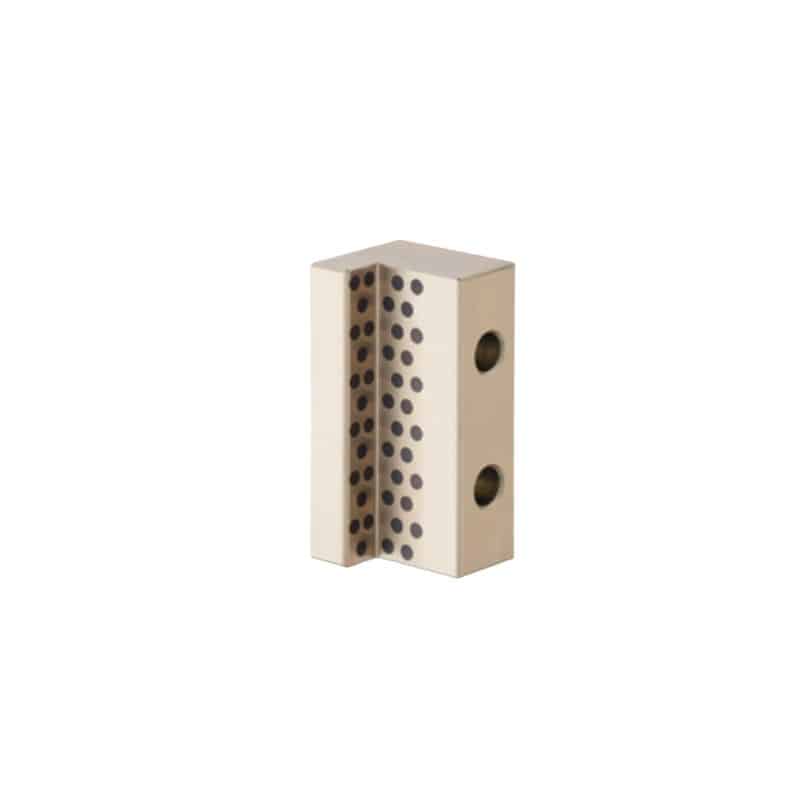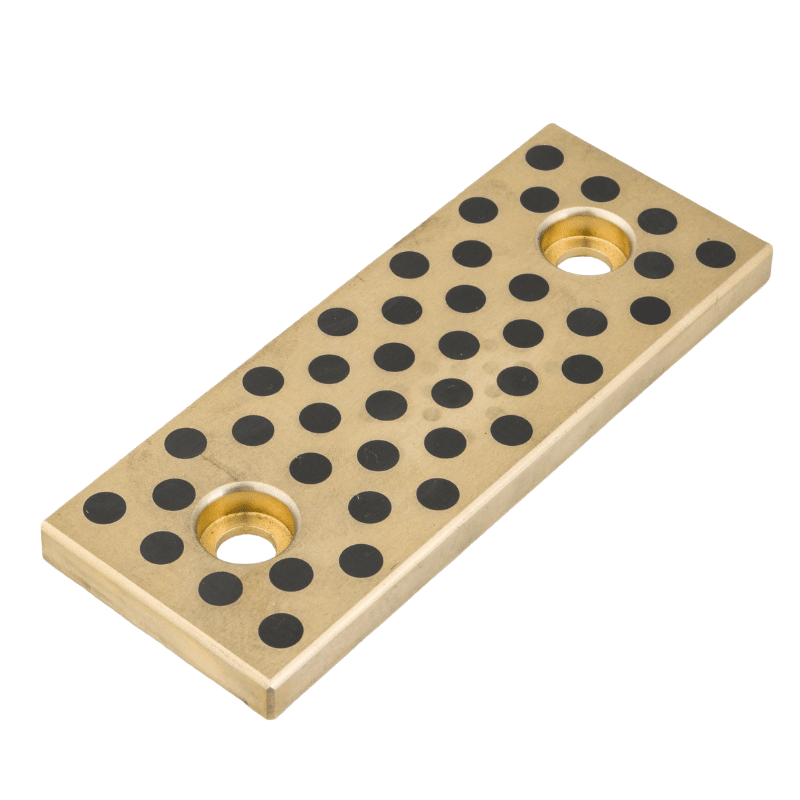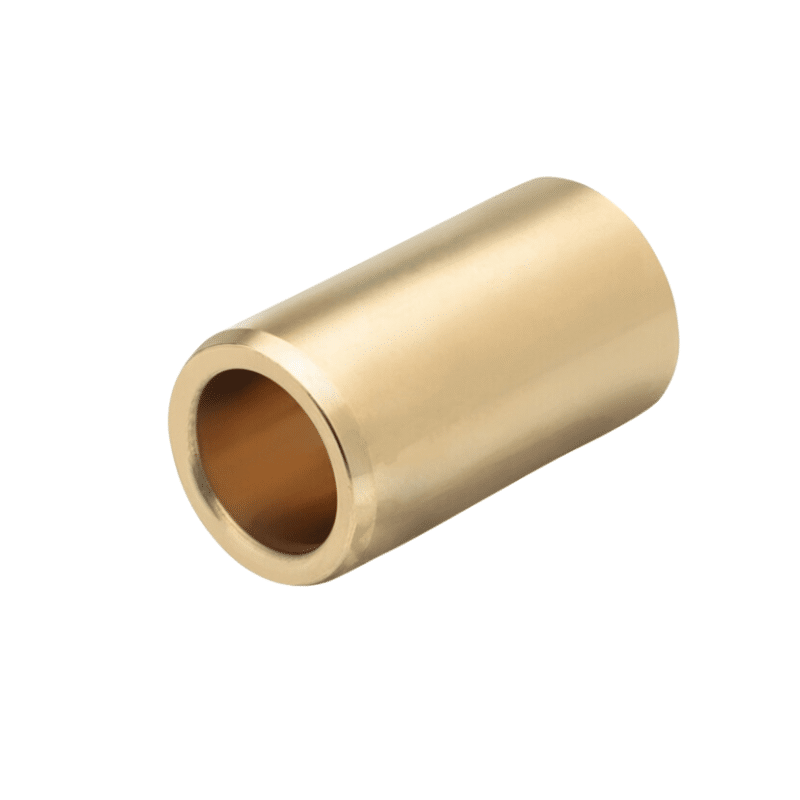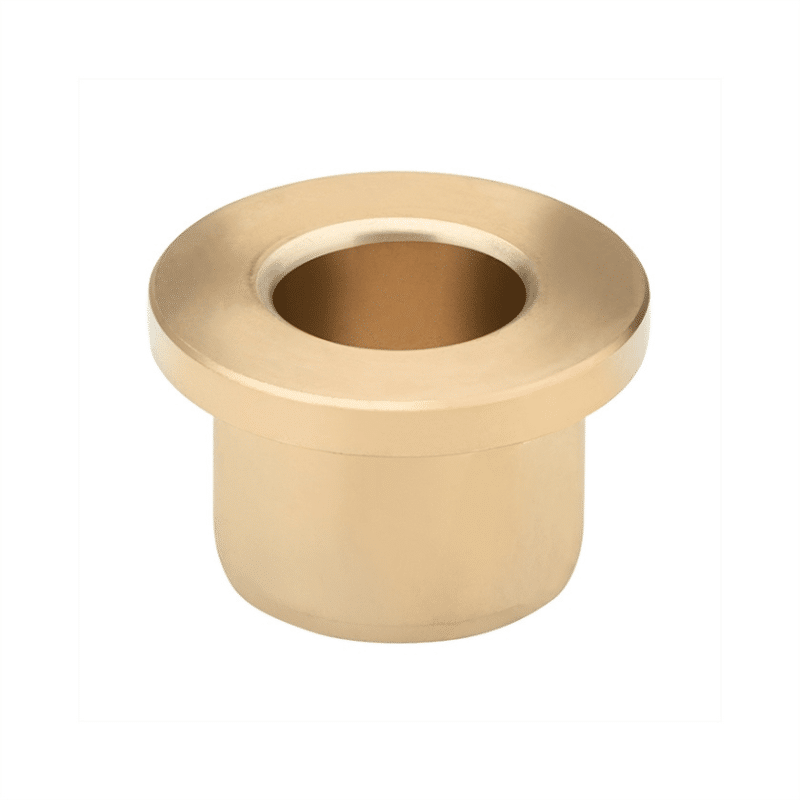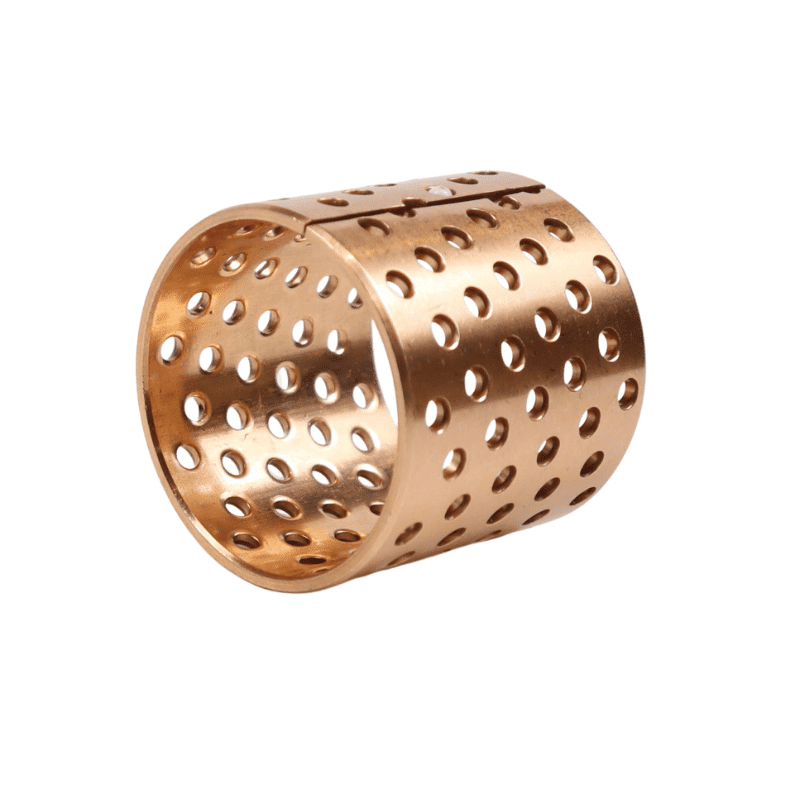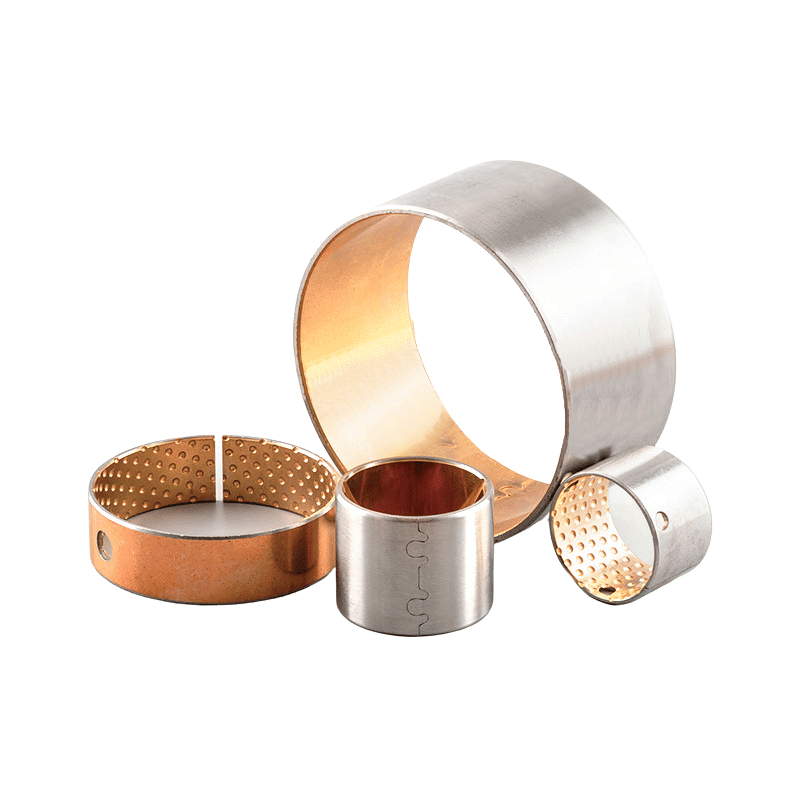GUIDE BRACKET, BRONZE WITH SOLID LUBRICANT, VDI 3387
GUIDE BRACKET, BRONZE WITH SOLID LUBRICANT, VDI 3387
Say goodbye to the hassle of frequent lubrication maintenance. Our self-lubricating technology ensures smooth operation and reduces wear and tear, extending the lifespan of your equipment. Experience uninterrupted productivity and cost savings as you bid farewell to the need for messy lubricants and time-consuming upkeep.
Manufacturing on Demand, alternative solutions
GUIDE BRACKET, BRONZE WITH SOLID LUBRICANT, VDI 3387
T-Guide bars made of bronze with solid lubricant provide a reliable and efficient solution for oilless lubrication in heavy-duty applications. They offer superior lubrication and wear resistance properties, eliminating the need for messy liquid lubricants and reducing the risk of contamination. With easy installation and minimal maintenance, T-Guide bars made of bronze with solid lubricant are an ideal choice for manufacturers looking to improve the efficiency and longevity of their machinery and components.
GUIDE BRACKET, BRONZE WITH SOLID LUBRICANT, VDI 3387
Bronze with solid lubricant, oilless lubricating
base material Cu 60–66% Al 5,0–7,5% Fe 2,0–4,0% Mn 2,5–5,0% Zn 17,5–31,5%
The following table provides information on the properties of oilless wear plates made of bronze with solid lubricant, based on the provided specifications:
| Property | Specification |
|---|---|
| Specific density [kg/dm3] | 8.2 |
| Tensile strength Rm [N/mm2] | 750-800 |
| Brinell hardness HB 10 | 180-210 |
| Yield point Rp 0.2 [N/mm2] | 450-550 |
| Elongation to fracture A5 [%] | 5-8 |
| Elasticity module [kN/mm2] | 105-115 |
| Coefficient of friction | 0.04-0.15 |
| Thermal conductivity [W/(m × K)] | 45-55 |
| Heat expansion coefficient [K-1] | 1.6-2.0 × 10-5 |
| Electrical conductance [m/(Ω × mm2)] | 7-8 |
| Alternating flexural strength [N/mm2] | ±150 |
| Ratio sliding surface to lubricant deposits % | 25-30 |
As the table shows, oilless wear plates made of bronze with solid lubricant have a specific density of 8.2 kg/dm3, and a tensile strength between 750-800 N/mm2. The Brinell hardness is between 180-210 HB 10, and the yield point ranges from 450-550 N/mm2. The elongation to fracture is between 5-8%, and the elasticity module is between 105-115 kN/mm2.
The coefficient of friction ranges from 0.04-0.15, while the thermal conductivity is between 45-55 W/(m × K). The heat expansion coefficient is between 1.6-2.0 × 10-5 K-1. Additionally, the electrical conductance is between 7-8 m/(Ω × mm2), and the alternating flexural strength is ±150 N/mm2. Finally, the ratio of the sliding surface to lubricant deposits is between 25-30%.
Overall, these properties make oilless wear plates made of bronze with solid lubricant highly durable, wear-resistant, and able to withstand heavy loads and high-speed operation. The low coefficient of friction and high thermal conductivity also make them efficient and reliable components for a wide range of applications.
The guide bracket is made of bronze material with solid lubricant, which allows for oilless lubrication. This material choice is in accordance with the VDI 3387 standard, which is a guideline for the design and construction of machine tool components.
Bronze with solid lubricant is a popular material choice for guide brackets due to its excellent self-lubricating properties. The addition of solid lubricant in the bronze material ensures that there is no need for oil lubrication during operation, making it a low maintenance option.
The guide bracket is an important component in machine tool design, providing support and guidance to other machine tool components. The use of bronze with solid lubricant in the guide bracket ensures smooth and efficient operation, reducing wear and tear on the machine tool.
One of the key benefits of using a guide bracket made of bronze with solid lubricant is its resistance to wear and tear. This material is known for its durability, and the addition of solid lubricant further enhances its ability to withstand heavy loads and high-speed operation. This makes it an ideal material choice for high-performance applications such as machine tools and automation systems.
Another advantage of using a guide bracket made of bronze with solid lubricant is its low coefficient of friction. This means that it generates less heat and reduces the risk of damage to the equipment. The low friction also means that it requires less power to operate, which translates to lower energy consumption.
In summary, a guide bracket made of bronze with solid lubricant and in accordance with the VDI 3387 standard is an excellent material choice for applications where high performance and low maintenance are required. Its self-lubricating properties, durability, and low friction make it a reliable option for a wide range of industries, including manufacturing, automation, and robotics.
An oilless wear plate is a type of plate used in machinery that is designed to operate without the need for oil lubrication. It is made of a material that has excellent self-lubricating properties, such as bronze with solid lubricant.
The VDI 3387 standard is a guideline for the design and construction of machine tool components. It provides recommendations for the use of oilless wear plates in machine tool design, specifying the materials, dimensions, and tolerances required for these components.
The following table provides more details on the VDI 3387 standard for oilless wear plates:
| Property | Specification |
|---|---|
| Material | Bronze with solid lubricant |
| Dimensions | According to machine tool design |
| Tolerance | According to machine tool design |
| Surface finish | Smooth |
| Lubrication | Oilless |
| Load capacity | High |
| Wear resistance | High |
| Coefficient of friction | Low |
As the table shows, oilless wear plates in accordance with the VDI 3387 standard are made of bronze with solid lubricant, have smooth surface finishes, and operate without the need for oil lubrication. They have a high load capacity and wear resistance, and a low coefficient of friction, making them ideal for high-performance applications such as machine tools and automation systems.
Overall, the VDI 3387 standard provides important guidelines for the design and construction of oilless wear plates, ensuring that they are made of appropriate materials and have the necessary dimensions and tolerances to function effectively in machinery.
Oilless wear plates are commonly made of bronze material with solid lubricant. The chemical composition of this material typically includes copper, aluminum, iron, manganese, and zinc, with varying percentages of each element.
In the case of the composition you provided, the oilless wear plate would have the following chemical composition:
- Copper (Cu): 60-66%
- Aluminum (Al): 5.0-7.5%
- Iron (Fe): 2.0-4.0%
- Manganese (Mn): 2.5-5.0%
- Zinc (Zn): 17.5-31.5%
The copper content in this composition provides the wear plate with excellent thermal and electrical conductivity, as well as good corrosion resistance. The addition of aluminum enhances the wear plate’s strength and hardness, while also increasing its resistance to wear and tear. Iron is added to improve the wear plate’s durability and toughness, and manganese helps to further strengthen the material. Finally, zinc is added to improve the wear plate’s resistance to corrosion.
The solid lubricant in the bronze material allows for oilless lubrication during operation, reducing maintenance requirements and improving overall efficiency. The resulting material is highly durable, wear-resistant, and able to withstand heavy loads and high-speed operation.
In summary, the chemical composition of oilless wear plates made of bronze with solid lubricant typically includes copper, aluminum, iron, manganese, and zinc in varying percentages. These elements work together to provide the wear plate with excellent thermal and electrical conductivity, strength, durability, wear resistance, and corrosion resistance, while the solid lubricant allows for oilless lubrication during operation.
Your expert in self-lubricating Bearing
and Bronze alloys – serving globally
Brand replacement products and functionally equivalent parts, alternative solutions
Manufactures flange bronze bearings, service & maintenance companies to meet the exacting specifications required in a wide range of industrial applications.
Machined bronze bushing that meet the exacting requirements & specifications supplied by our clients. Spherical bearings, spindles, semi-spheres and supports that we have manufactured.
You will find to follow a selection of self lubricating bronze bearing material CuSn7Zn4Pb7, CuSn12, CuAl10Fe5Ni5,
CuZn25Al5Mn4Fe3
Alternative solution,We offer an outsourced machining service for bronze bushes, manufacturing precise parts to the designs supplied to us by our clients.
Selection of other composite bushing material of self lubricating bearing that we have manufactured.
Wrapped Bronze Sleeve Bearing, Are you interested in our products?
Manufacturer of bimetal and steel bronze bushing parts according to client’s drawing.

